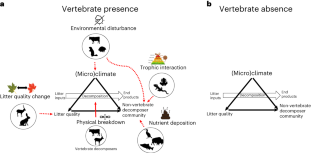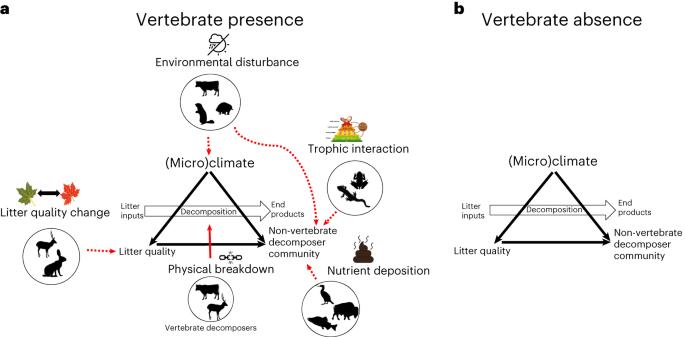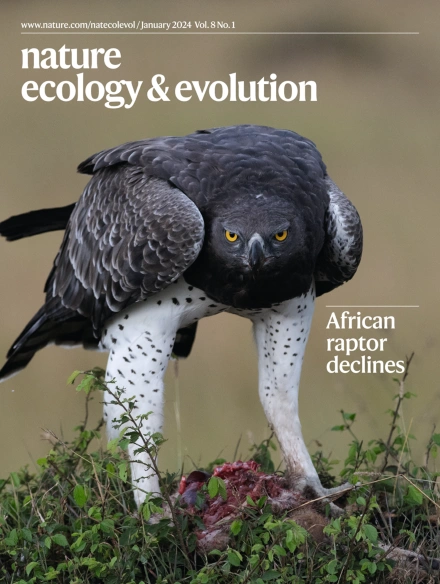Meta-analysis reveals that vertebrates enhance plant litter decomposition at the global scale
IF 13.9
1区 生物学
Q1 ECOLOGY
引用次数: 0
Abstract
Evidence is mounting that vertebrate defaunation greatly impacts global biogeochemical cycling. Yet, there is no comprehensive assessment of the potential vertebrate influence over plant decomposition, despite litter decay being one of the largest global carbon fluxes. We therefore conducted a global meta-analysis to evaluate vertebrate effects on litter mass loss and associated element release across terrestrial and aquatic ecosystems. Here we show that vertebrates affected litter decomposition by various direct and indirect pathways, increasing litter mass loss by 6.7% on average, and up to 34.4% via physical breakdown. This positive vertebrate impact on litter mass loss was consistent across contrasting litter types (woody and non-woody), climatic regions (boreal, temperate and tropical), ecosystem types (aquatic and terrestrial) and vertebrate taxa, but disappeared when evaluating litter nitrogen and phosphorus release. Moreover, we found evidence of interactive effects between vertebrates and non-vertebrate decomposers on litter mass loss, and a larger influence of vertebrates at mid-to-late decomposition stages, contrasting with the invertebrate effect known to be strongest at early decomposition stage. Our synthesis demonstrates a global vertebrate control over litter mass loss, and further stresses the need to account for vertebrates when assessing the impacts of biodiversity loss on biogeochemical cycles. Across terrestrial and aqueous ecosystems, vertebrates increase litter decomposition, both directly and indirectly, by 6.7% on average, and this effect interacts with but generally occurs at a later stage of decomposition than the effect of invertebrates.


元分析表明,脊椎动物在全球范围内促进了植物废弃物的分解。
越来越多的证据表明,脊椎动物的衰退对全球生物地球化学循环有很大影响。然而,尽管枯落物腐烂是全球最大的碳通量之一,却没有全面评估脊椎动物对植物分解的潜在影响。因此,我们进行了一项全球荟萃分析,以评估脊椎动物对陆地和水生生态系统中枯落物质量损失和相关元素释放的影响。我们在此表明,脊椎动物通过各种直接和间接途径影响了垃圾的分解,平均增加了6.7%的垃圾质量损失,通过物理分解增加了高达34.4%的垃圾质量损失。脊椎动物对枯落物质量损失的这种积极影响在不同的枯落物类型(木本和非木本)、气候区域(北方、温带和热带)、生态系统类型(水生和陆生)和脊椎动物类群之间是一致的,但在评估枯落物氮和磷释放时却消失了。此外,我们还发现了脊椎动物和非脊椎动物分解者对枯落物质量损失产生交互影响的证据,而且脊椎动物在中后期分解阶段的影响更大,这与无脊椎动物在早期分解阶段的影响最强形成了鲜明对比。我们的综合研究表明,脊椎动物对枯落物质量损失具有全球性的控制作用,并进一步强调了在评估生物多样性丧失对生物地球化学循环的影响时考虑脊椎动物的必要性。
本文章由计算机程序翻译,如有差异,请以英文原文为准。
求助全文
约1分钟内获得全文
求助全文
来源期刊

Nature ecology & evolution
Agricultural and Biological Sciences-Ecology, Evolution, Behavior and Systematics
CiteScore
22.20
自引率
2.40%
发文量
282
期刊介绍:
Nature Ecology & Evolution is interested in the full spectrum of ecological and evolutionary biology, encompassing approaches at the molecular, organismal, population, community and ecosystem levels, as well as relevant parts of the social sciences. Nature Ecology & Evolution provides a place where all researchers and policymakers interested in all aspects of life's diversity can come together to learn about the most accomplished and significant advances in the field and to discuss topical issues. An online-only monthly journal, our broad scope ensures that the research published reaches the widest possible audience of scientists.
 求助内容:
求助内容: 应助结果提醒方式:
应助结果提醒方式:


